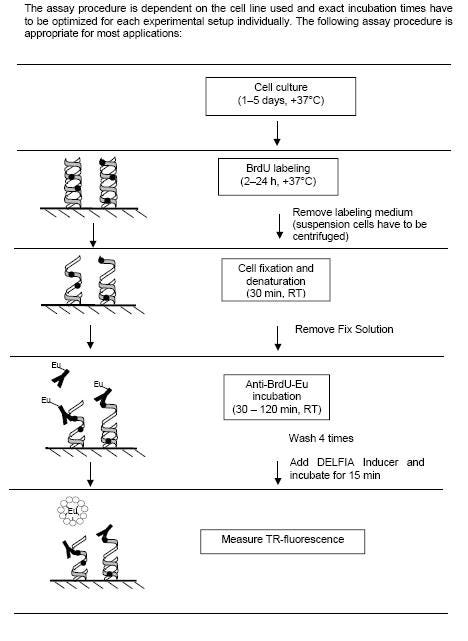
Overview
The DELFIA™ cell proliferation assay measures cell growth by monitoring the incorporation of BrdU into newly synthesized DNA strands of proliferating cells cultured in plates. Incorporated BrdU is detected using an anti-BrdU Europium-labeled monoclonal antibody. The format is similar to a 3H thymidine incorporation assay but is a non-radioactive alternative. Cells are fixed during this assay.

Figure 1: DELFIA cell proliferation assay principle. Cells are incubated with the non-radioactive pyrimidine analog BrdU to allow its incorporation into newly synthesized DNA in place of thymidine. Subsequently, Europium-labeled anti-BrdU antibodies are used to detect the level of BrdU incorporation via time-resolved fluorescence, a measurement used as an accurate indicator of cell proliferation.
What do I need to run this assay?
Required reagents available from Revvity:
- DELFIA cell proliferation kit (catalog number AD0200)
- TC-treated (tissue culture-treated) sterile microplates (we recommend white-walled, clear-bottom ViewPlates™)
Required reagents available from various suppliers:
- Culture media
- Cells
Instrumentation/Equipment:
- A TRF-capable plate reader
- Plate shaker (we recommend our DELFIA Plateshake)
- Optional: Plate washer (we recommend our DELFIA Platewash)
Products and catalog numbers
View a listing of DELFIA products and catalog numbers.
Protocol-in-brief
Please refer to the manual for more detailed information.

Figure 2. Workflow for DELFIA cell proliferation assay
Citations
View a brief list of DELFIA cell proliferation citations.
Using the DELFIA cell proliferation kit with suspension cells
- Place appropriate number of cells in a 96-well plate (e.g., in a final volume of 200 µL per well) and incubate them with the substance to be tested at 37°C in a humidified 5% CO2 atmosphere. The incubation period depends on the cell type used. For most experimental approaches, an incubation period of 24-120 hours is appropriate.
- Label cells with BrdU by adding 20 µL of diluted (100 µM) BrdU Labeling solution to each well if the cells were cultured in 200 µL of culture medium. Continue incubating the cells for an additional 2 to 24 hours at 37°C in a humidified 5% CO2 atmosphere. NOTE: The volume of BrdU Labeling solution to be added depends on the volume of the cell culture, and the final concentration of BrdU in the wells should be 10 µM.
- Centrifuge the plate at 300 x g for 10 minutes before removing the labeling medium. After removing the medium, incubate at 60°C for 1 hour or until the wells are dry.
- Add 100 µL of Fix solution to each well and incubate for 30 minutes at room temperature.
- Remove the Fix solution thoroughly from the wells either by inverting the plate and shaking it, or by aspiration.
- Add 100 µL of anti-BrdU-Eu working solution (0.5 µg/mL) to each well and incubate for 30--120 minutes at room temperature.
- Wash 4 times using the DELFIA Platewash with approximately 300 µL of Wash solution per well.
- Add 200 µL DELFIA Inducer to each well using the DELFIA Plate Dispense or Eppendorf Multipipette. When using the DELFIA Plate Dispense, make sure that the tubing is flush with DELFIA Inducer before dispensing into the well. Shake the plate on the DELFIA Plateshake at room temperature for 15 minutes (slow shaking). When using a different shaker, check that the liquid is moving constantly.
- Measure the Eu-fluorescence in a time-resolved fluorometer, such as VICTOR™2V or the EnVision™ using parameters recommended in the kit manual.
For research use only. Not for use in diagnostic procedures.
The information provided above is solely for informational and research purposes only. Revvity assumes no liability or responsibility for any injuries, losses, or damages resulting from the use or misuse of the provided information, and Revvity assumes no liability for any outcomes resulting from the use or misuse of any recommendations. The information is provided on an "as is" basis without warranties of any kind. Users are responsible for determining the suitability of any recommendations for the user’s particular research. Any recommendations provided by Revvity should not be considered a substitute for a user’s own professional judgment.




























